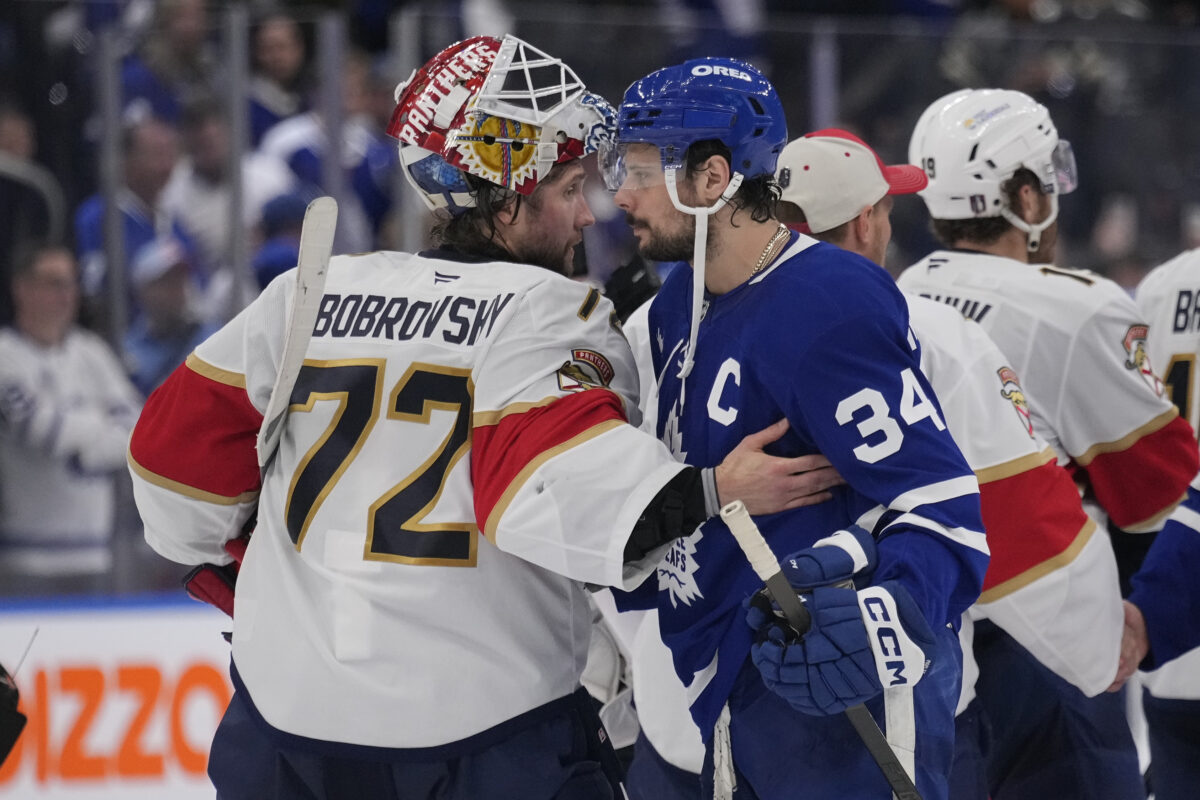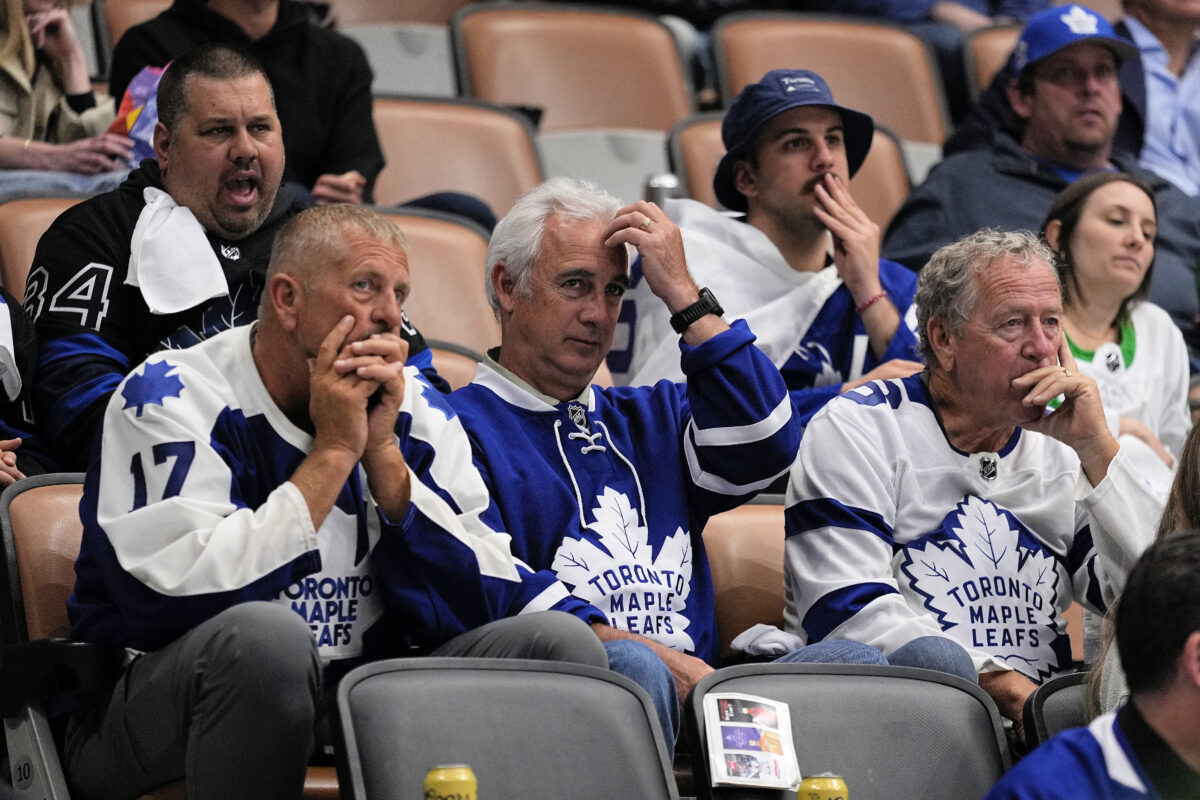Last Saturday, my friend Greg and I visited Qualicum Beach, British Columbia, as part of our ongoing quest to find the best burger on Vancouver Island. We ate at Q Burger, known as one of the top five burgers in the country—and we were not disappointed.
But this isn’t a review of a hamburger joint. While we were eating outside at our sidewalk table, a line of people was waiting to get in. We struck up a conversation with a group of vacationing moms as the line wound around our outdoor table. I asked if they were hockey fans. One was from Toronto, another from Edmonton, and a third from Victoria (British Columbia’s capital city).
Related: Frank Mahovlich: Highs & Lows of a Hall of Fame Career
I asked the mom from Toronto if she was a Toronto Maple Leafs fan. She said no—but her 11-year-old son was, which, in her words, “doomed him to a life of endless frustration.” In a nutshell, that’s been the storyline of Maple Leafs fans ever since the last Stanley Cup win in 1967.
Being a Maple Leafs Fan Is a Lifestyle
Being a Maple Leafs fan isn’t just a hobby—it’s a lifestyle, and a pretty chaotic one at that. One minute, you’re cursing the screen because you don’t think William Nylander tried hard enough to prevent an icing call. In almost the next breath, you’re defending the team from a Boston Bruins fan who lays into Simon Benoit because he’s not good enough to be an NHL blueliner. So what’s going on here?

Why do Maple Leafs fans exist in this strange space between lifelong devotion and nonstop criticism? There’s more at play than passion alone. It’s sports, identity, and history tangled together.
Maple Leafs Fans “Yell Because They Care”
You don’t stick with a team like the Maple Leafs just for fun. You stick around because it’s personal. Whether you’ve been watching since the Harold Ballard days or joined during the Auston Matthews era, being a Maple Leafs fan means investing your time, your patience, and your sanity.
Related: NHL’s Atlantic Division Likely to Be a Gauntlet in 2025-26
That kind of commitment builds history—and history comes with baggage: blown leads, cursed Game 7s, painful offseasons. These aren’t just stats; they’re moments etched into memory. You’ve put in the time, you’ve felt the sting, so when things go off the rails, your frustration isn’t empty noise. You’re yelling because you care. Your enduring patience has earned the right to have a voice.
Outsider Criticism of the Maple Leafs Doesn’t Land the Same
Maple Leafs fans love to vent. But when someone outside the fanbase chimes in with a sarcastic remark or lazy dig, it hits differently. It’s like family: you can rib your sibling all day, but a stranger? No chance. Criticism from outsiders often misses the emotional context.

Outsiders haven’t lived through 2013’s Game 7 collapse against Boston, which perfectly captures the Maple Leafs’ life of frustration. The team led 4–1 late in the third period, only to see the Bruins score three goals in the final seven minutes and win in overtime. Such gut-wrenching collapses still haunt Maple Leafs fans as symbols of playoff heartbreak.
Related: Can the Maple Leafs Find the Mean Streak to Bridge the Postseason Gap?
Recent seasons have seen a litany of Matthews-era playoff near-misses, as well. Still, every season, the Maple Leafs have once again become the punchlines of outsiders. That feels out of place. I’m watching it again this season. With Mitch Marner now a Vegas Golden Knight, hockey pundits are dropping the team out of the playoff picture. Yet, ironically, Maple Leafs fans are as hopeful as ever. Somehow, could this team be better – addition by subtraction – as illogical as that might seem?
That offseason optimism is just part of the fan code if you cheer for the Maple Leafs.
Being a Maple Leafs Fan is a Tug-of-War That Never Ends
Every Maple Leafs fan knows the rhythm: you shake your head after another blown lead, swear you’re done, and then… you’re watching the next game two nights later. It’s not a weakness; it’s just how it works. Frustration and loyalty often coexist. Learned psychologists refer to it as “cognitive dissonance.” Maple Leafs fans call it Tuesday.

Mandatory Credit: John E. Sokolowski-Imagn Images
The point is that, if you’re a Maple Leafs fan, you’re allowed to be mad and still hope. You’re allowed to criticize and still believe. That push and pull is built over decades of almosts, near-misses, and heartbreaks.
Criticism of the Maple Leafs Isn’t a Lack of Loyalty
Pointing out mistakes doesn’t make you negative; it makes you invested. You see the gaps, you know the flaws, and you still believe the team can succeed. Each fall, hope resets automatically. You scan the roster, consider matchups, run the math in your head: “Okay, if the goaltending holds and the bottom six steps up…”
Related: How the Dubas vs. Lamoriello Decision Shaped the Maple Leafs
Years of heartbreak build community. You don’t need to explain to another Toronto fan that your team was “up 4-1 in the third.” The other fan already gets it. Shared venting becomes a kind of language. A stranger in a Maple Leafs jersey waiting in line for a burger on Vancouver Island? You already understand each other.
That’s loyalty and connection. That’s what it means to be part of the fanbase. And when that Stanley Cup finally arrives, it will be sweeter than anything else in sports because it’s been earned through heartbreak and hope along the way.
[Note: I’d like to thank Brent Bradford (PhD) for his help co-authoring this post. His profile can be found at www.linkedin.com/in/brent-bradford-phd-3a10022a9]
